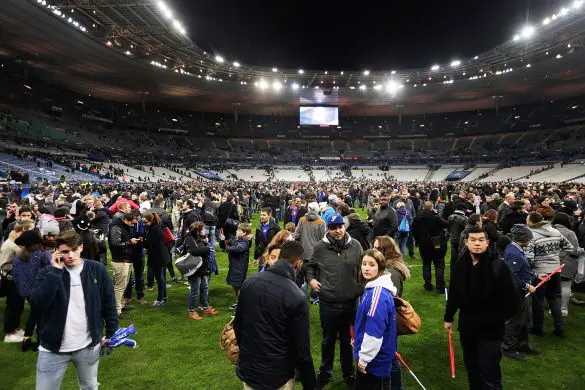As the ten-year-anniversary of the November 2015 Paris terror attacks approached, German public broadcaster ARD released a documentary on the experiences of the German national team during the fateful night in the French capital. The Stade de France served as one of the epicenters. Joachim Löw’s German Nationalmanschaft were contesting a friendly at the Stade de France when three suicide bombers detonated their vests outside the stadium over the course of 40 minutes.
Matters could have ended up much worse on November 13th, 2015. The suicide bombers planned to enter the stadium that night and inflict mass carnage. One member of the trio had tickets to the game. After the first bomber detonated his vest inside the stadium crowd, two more bombers in Bayern Munich track suits waited outside the grounds to capitalize on the panicked rush outside of the stadium.
As it turned out, a French security guard prevented the first bomber from entering the stadium. The three bombers then tried to improvise by detonating among other throngs of collected individuals. There were plenty of casualties, but only one fatality apart from the bombers.
French authorities also arrived at the wise decision not to inform any of the fans inside the stadium or even the players contesting the match about what had just occurred. The game proceeded as planned without any of the participants knowing about the bombings.
It was such that no panic was stirred. A rush towards the exit might have resulted in a crush and more fatalities. Instead, everything proceeded as normal. The German national team would end up spending the night at the stadium for security reasons.
Current SC Freiburg defender Matthias Ginter experienced the ordeal in Paris as a German national team representative. Less than two years later, Ginter also experienced the April 11th, 2017 attack on the Borussia Dortmund team bus ahead of the Champions League quarterfinal against AS Monaco.
The now 31-year-old reflected on both incidents in an interview for the Thursday print edition of Kicker. Ginter didn’t hesitate for a second when asked by interview Oliver Hartmann whether he wished to discuss both events.
The Freiburg native’s emotions about the two harrowing affairs nevertheless still came through.
“I heard a loud bang [in the 17th-minute] and felt a shock wave,” Ginter – who was 21 at the time – recalled. “One is used to hearing firecrackers in the stands, but this was something different. I glanced up at the stands, which I never do, but there was nothing there. Then I was right back in the game. I first realized that something was up when the French fans weren’t celebrating their 2-0 victory after full time. I knew something wasn’t right.
“We weren’t allowed to go visit our fans after the full-time-whistle,” Ginter continued. “We were told to go straight to the locker room. Oliver Bierhoff told us that there had been attacks in Paris and an attempt to infiltrate the stadium. It only became real to me when I entered the locker room and opening up my cell phone. There were texts from friends and family members asking if I was okay.
“[Forced to spend the night in the locker room], I remained wide awake texting family members,” Ginter went on. “We drove to the airport through a deserted city. Not a single person. Not a single car. No lights in the houses. The shutters were down everywhere. There was simply no life there, and that in such a lively metropolis, it was really very strange.
“I would hate to compare the two, but the Dortmund attack was on a more personal level,” Ginter began when discussing the second incident. “When the smoke and smell filled the bus and everyone shouted ‘Get down!’, I really thought, ‘Okay, someone’s coming in now and that’s it.’ It was closer and more threatening than in Paris.
“After the second attack, I wondered if all of this [playing football] still made sense,” Ginter ruminatively noted. “When I had a day or two off afterwards, I said to my girlfriend at the time, now my wife: ‘Wow, I can’t do this anymore. I don’t feel like it anymore’. I chalked up the first attack in Paris as a kind of negative lottery win, so unrealistic that it would never happen again. When it happened again, I asked myself: Is it worth it?
“I still don’t like sitting by the window on the team bus, but I have no problem getting on the bus,” Ginter continued. “And even if a firecracker is set off in the stadium, it doesn’t bother me. But if I see a backpack standing alone on a train or at a concert, I look at it differently than I did before the attacks. Or if, for example, a truck drives slowly past while we’re out walking, I say to my wife, ‘Let’s cross the street. Let’s cross the street.’
“There’s no such thing as 100 percent security in football or in life,” Ginter concluded. “The atmosphere [in the rescheduled Champions League fixture] and the sense of solidarity made it the most incredible game of my career. We also played France again [in an October 2018 Nations League game]. We followed the same routines and I no longer had bad thoughts about the hotel, stadium, or locker room. That helped put it behind me.”









